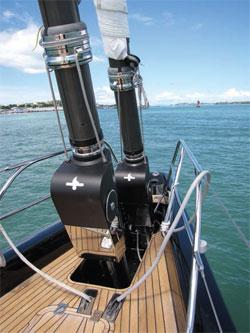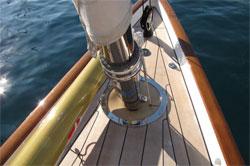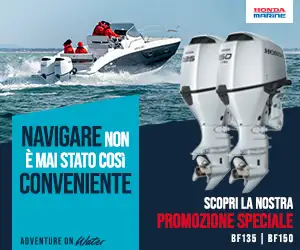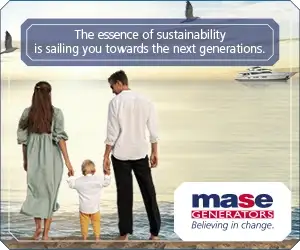
Reckmann furling systems have a far longer life span – 20 years or more of faultless service with very little maintenance being par for the course
Furling todays huge sails means some things always have to work
When it comes to furling today’s huge sails in a hurry it is good to know that there are 130 years of development and engineering excellence behind the key components upon which you are relying
At wind speeds of more than 50kts, everything should still work. That’s the self-imposed standard of safety, reliability and durability Reckmann builds into its products, which is why you’ll find Reckmann sail control systems – headsail and mainsail furling gears, rigging hydraulics and more – on so many of the world’s finest (and largest) sailing yachts. Three quarters of the superyachts competing in the St Barth’s Bucket last year had Reckmann furling gear and hydraulics, for example, and a similar proportion of the fleet at the Superyacht Cup.
‘The most important thing for us is that our clients can rely on us and our products,’ says Reckmann’s chief executive, Marcus Schuldt. ‘We have been in business now for 129 years and our focus is on quality, reliability and function. It’s not unusual for us to receive a furling gear back for its first service after 20 years of troublefree use, which demonstrates the exceptional quality of these products.’ It might not be unusual for Reckmann but it is remarkable for a yacht rigging systems manufacturer, given that nearly all other components of a large yacht’s rig (except perhaps the spars themselves) aren’t expected to last even half that long, even with regular and diligent servicing.
Reckmann prides itself on being a rather unusual company with a singular ethos. As proudly announced on its website, it has never registered any of its groundbreaking inventions as patents ‘because we remain convinced that fast, innovative solutions are more important to our customers than worldwide patent coverage. It’s impossible to prevent imitations and our “way of nonpatenting” is our contribution to the excellent value for money of our products and leads to happy and convinced clients. Another advantage is that it also encourages us to continually redesign and further develop our products.’
Product design is a collaborative process. ‘As soon as we have a product idea we sit together as a team and discuss the main features and benefits for the client,’ Schuldt explains. ‘Then we do the first proposals and produce a prototype.’
Even a determined imitator is unlikely to match Reckmann’s levels of reliability and there’s a straightforward reason for that. For every new product, whether it’s massproduced in large numbers or a custom made one-off, a full-scale working prototype is subjected to the most punishing testing regime possible – simulating the worst possible real-world conditions the product is ever going to face, over a long period of time – before the green light is given to manufacture the product for sale. And if the prototype doesn’t perform perfectly in testing, it’s back to the drawing board.
Another notable thing about Reckmann is that it’s been owned and run by the same family for more than two thirds of its history, which goes back nearly 130 years. The current chief executive, Marcus Schuldt, joined the company in 1991 straight after his engineering degree and later took over from his father Horst Schuldt, a master sailmaker and champion Dragon keelboat racer, who also took control of Reckmann from his father back in 1962. And the tradition continues with Marcus’ daughter Catharina, also an engineer, joining the family business in 2020 – she’s now a project manager for the Sailtec division. ‘I have grown up with the company. Even my work experience spells while still at school were done here,’ she says. ‘Through the years I had the opportunity of accompanying my father to a vast range of exhibitions, such as the Monaco Yacht Show, gaining my first insights into the field of mega-yachts.’
Reckmann’s ethos and heritage strongly inform its approach to business. ‘It’s a bit different to most other companies nowadays,’ Marcus Schuldt says. ‘We are not interested in making a quick deal. Our focus is on long-lasting, trustful relationships with our business partners and clients. We’ve been working closely with many well-known boatyards for 30 or 40 years and that is what Reckmann stands for. Reliable, long-term and trustful relationships.’
‘Another important point is that we have very experienced sailors in the team who sail with our clients in major regattas to check the performance of our gears, to see if we can improve them in any way,’ Schuldt says. ‘It’s always good to keep in close contact with clients.’
It starts with a talented design team, of course, but the high standard of excellence is maintained all the way down the line. ‘The most important part for me as a designer is when the parts I have created arrive and are assembled,’ says Reckmann’s lead designer Burkhart Heberle. ‘That is when teamwork has an impact. Colleagues from the workshop are also involved and you can see the results after the product has been properly assembled.’
'Quality and functionality have always taken centre stage at Reckmann,’ Heberle says, ‘and this is profoundly important even though times have changed, everything is fast-moving and we have a wider range of products. It’s our duty and a challenge to maintain these values. My personal approach is to be clear, simple and direct without concealing the technical demands that remain an integral part of the design.’

Minimal servicing is also built into the Reckmann ethos. ‘Our products are made to be very long-lasting and they require very little maintenance,’ says Schuldt. ‘Customers choose us for our products’ high quality and because they get top service from us for the entire lifespan of the product. We produce all of the parts locally so our products are completely made in Germany and assembly always takes place in house.’
Sail control systems remain the company’s core focus – and probably always will be – but Reckmann has diversified in recent years, growing and entering new markets by acquiring other companies that are similarly successful within their own niche. For example Holmatro’s highly regarded hydraulic cylinders, pumps and power packs joined the Reckmann product line in 2013 and NSM’s drive systems for furling booms in 2014. In 2015, the takeover of Sailtec gave Reckmann an entry into the powerboat market for sun shade systems, where its 40- year experience with sail furling technology translated directly into the production of high-end awnings for superyachts and textile engineering projects such as finite element modelling (FEM) design of solar panels and the production of large-scale tensile membranes.
‘Our know-how from the world of sail reefing has enabled us to create large complex systems and the advantages for our customers are the same as for our reefing systems – extremely long service intervals and long product lifespans,’ Schuldt says. Indeed, one of Reckmann’s first forays into large-scale architectural shade systems, long before Sailtec joined the team, was an enormous automaticfurling shade sail system installed on the Festo corporation’s glass-clad global headquarters building in Esslingen, Germany. It’s still working faultlessly 20 years later and has led to further commissions. On a much smaller scale, the McDonald’s fast food restaurant in Leipzig shows what can be done with Reckmann MFseries manual furlers, more commonly seen on high-quality 35ft sailing yachts, to provide shade and shelter for diners on an outdoor terrace.

Back in the high-performance sailing world, Reckmann has begun to attract customers for a new reason – sustainability. As boatbuilders respond to their clients’ demands for more sustainable yacht production and start using life cycle assessment tools to reduce the environmental impact of their supply chain, it makes a lot of sense for them to fit furling and reefing systems that are designed to last for a lifetime and can very easily be repaired rather than slightly cheaper systems that will need to be discarded and replaced after a number of years. For any boatbuilder that measures its own sustainability in a meaningful way, fitting Reckmann gear is an instant win.
But it’s not just the longevity of the products that makes Reckmann the sustainable sailor’s choice. A worldwide repair service is available even for old models, which includes replacing any worn-out parts and testing all components. And for new furling and reefing systems, responsible manufacturing – taking full responsibility for the resources used – is also assured.
‘Reckmann stands for real German workmanship,’ Schuldt says. 'We attach great importance to producing mainly in Germany. To achieve this, the team relies on the latest technologies to consume less energy and resources, as well as not compromising on materials that can cope with a minimum of service and associated costs. Investing in Reckmann quality equipment is a good investment for the future.’








